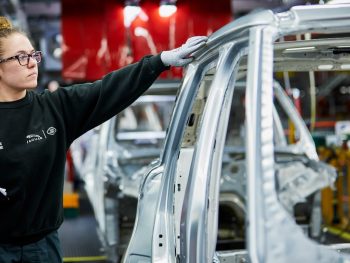UK car production slumps 38% in coronavirus lockdown
Output at UK car plants fell 37.6% in March as a result of the lockdown, costing the sector and economy billions for each week of shutdown.

The crisis could cost the UK automotive sector at least £8.2bn if factories remain closed until mid-May
Figures from the Society of Motor Manufacturers and Traders (SMMT) show just 78,767 vehicles left factory gates in the month, some 47,428 fewer than March 2019. Output for the UK and overseas markets were both down, 36.8% and 37.8% respectively. But in one bright spot of news, shipments to China rose 2.3% as lockdown measures began to ease.
The downturn means production for the first quarter fell 13.8%, with 319,252 vehicles leaving factory gates compared with 370,289 in the same period in 2019.
A new independent outlook by Auto Analysis has also revealed how the crisis could cost the industry at least £8.2bn if factories remain closed until mid-May; equivalent to around a fifth of UK carmakers’ combined annual turnover.
The SMMT has also warned that the outlook could be much worse, however, if subsequent demand is weak and the speed at which production lines are able to ramp up is constrained. It’s calling for showrooms to be permitted to open as soon as the situation allows.
A survey on the impact of Covid-19 on UK businesses across the automotive sector has also found that half (50.5%) of automotive manufacturers say that revenues so far have fallen by more than a 50%.
And more than a quarter (26.0%) of respondents reported cash reserves of less than three months, while 29.3% have projected recovery to take between 12 and 24 months.
Mike Hawes, SMMT chief executive, warned that liquidity remains a major concern and called for a package of measures to support the entire industry, including demand-side measure to help encourage customers back into the market.
His comments follow concerns raised by the European Automobile Manufacturers’ Association (ACEA) for the auto industry in Europe; it’s outlined a set of four guidelines to ensure the auto industry can relaunch and help with overall economic recovery, including fleet renewal programmes.
The SMMT has also said a successful restart of the UK automotive sector will require close coordination and cooperation between government and industry built on four pillars; from re-opening showrooms and stimulating demand, to ramping up safe and sustainable production, securing and supporting resilient supply chains, and ensuring a supportive regulatory framework is in place.
KPMG has also said that “collaboration is key to getting the sector back on a sturdy footing”.
Andrew Burn, partner and head of automotive at KPMG UK, commented: “Whilst the figures show the gravity of the impact of Covid-19, they are likely to be substantially better than the results we will see for April’s production levels when those figures are released.
“The silver lining at present lies in exports, most notably to China, as sales have started to come back. We are already starting to see some production restarting in Germany and the UK’s carmakers are working on their own plans to restart production. However, I anticipate we will see a soft restart with only certain models being focused on initially, and at much reduced volumes to those we were seeing before the crisis. This will be driven partly by demand and partly by the impact of social distancing measures being required in the production facilities in order to remain compliant with the new HSE guidelines. The key questions, however, are whether a prolongation of the UK lockdown will delay restart plans and also the extent to which challenges in the supply chain will affect vehicle production.”
He added: “Industry and government need to be working together, within the confines of antitrust laws, to ensure the level of disruption, particularly from supply chain, is minimised.”

















